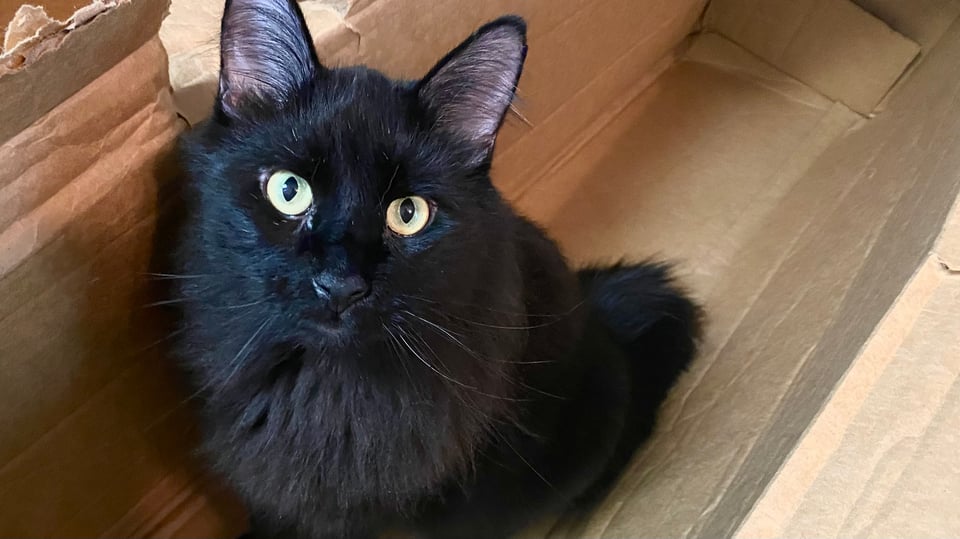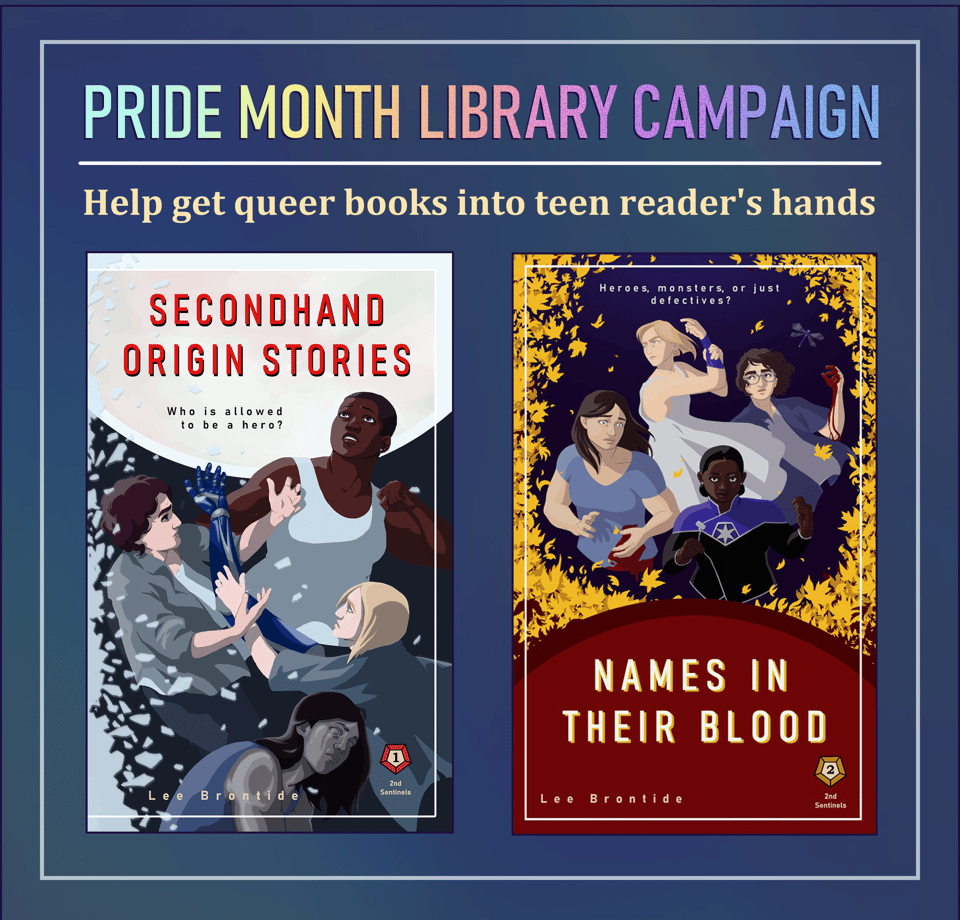Shadowing the Double Helix

Hello!
Before I get started, my ask this month is still brief and free, but a little bit more personal. It’s still the final day of Pride month, and so I am asking everyone I can to consider requesting that their local library carry my books. I’ve added them to the market that most US libraries buy from, and even gussied the files up a bit.
I’m never going to go tictok viral, so the best way for me to get my books into the hands of the teenagers I wrote them for is for them to be free at the local library. The being queer, but stealthily so, can help them get onto shelves that might otherwise have turned them away. I wrote these book with queer teens in my heart, and am always on the hunt for ways to reach them.
The exact method of requesting that your library carry a book is different depending on where you live, but it’s free, and in my experience it takes about 5 minutes. Pop over to the website for your local branch to find out how!

Ok, that out of the way, it’s time for the follow up to both last month’s newsletter on the state of medical data privacy, which in turn was a followup to a newsletter three years ago about why I think science fiction should be more on top of this critical frontier of tech and society.
As promised, this month is a deeper dive into data privacy with DNA, specifically.
I wanted to also talk about DNA and trademark, but to be honest, I haven’t managed to wrap my head around that, yet.
There’s been major news on DNA and privacy as recently as March. Turns out, 23andme continues to shop for buyers to save them from their financial distress. That’s not an interesting development in and of itself, but I did think it was interesting that the California Attorney General as well as several law professors are encouraging customers to go and delete their data out of the database before a buyout.
23andme makes some amount of money from selling their DNA testing kits, but they also make a good chunk of change from selling DNA data; they have about 30 contracts with biotech and pharmaceutical companies. Most of these are undisclosed, so I can’t deep dive into that.
But I don’t categorically object to DNA data being sold to medical companies.
I actually like the idea of massive databases correlating genomes, symptoms and experiences. Some of this is just easier with really really big numbers. Those who remember that time I took a DNA test to try to figure out just why I’m so excessively bendy may remember that my data was being added to a dataset to help identify brand new hypermobile genetic disorders. My doctor was particularly keen to add me to that data set because I had already found a fairly effective treatment. That means, if they find people with a similar genetic condition, we suddenly have a low cost, low side effect, already developed medication with the potential for a huge impact. That’s fantastic!
Outside the US it’s becoming increasingly common to use DNA tests to, for example, shortcut endless medication trials to figure out which medication is most likely to help an individual with their specific mental health concerns. This helps prevent issues like people taking Prozac who have the genetic marker that causes Prozac to make them incredibly suicidal.
Considering how many psychiatrists I know who like to try that medication first (why???), that makes this is a super valuable tool that can prevent a lot of potential suffering. (US insurance companies don’t like paying for these, which means we don’t get them, but it’s coming.)
Now I have some reservations about the profit-driven ways some of these companies function, here are some to get you started.
But we do need them, and I can’t deny that there’s some absolutely staggering medical developments coming from some of these companies.
I just really want them to be more uniformly better behaved.
Interestingly, both 23andme and Ancestry.com do actively resist DNA requests from police, although Ancestry does have some record of complying with requests…for credit card use and identity theft? Couldn’t find details on that, but that is their claim. There must be quite a story, there.
This refusal is fascinating to me, because usually corporations love complying with police requests, including for protected health information.
To give a scale to this, let me tell you about a thing that happened when I was in graduate school to become a therapist. One day, one of my professors announced that we would be deviating from the syllabus. They closed the door to the classroom for the first time ever, looking resolute but palpably nervous. This was a planned lecture that they had not wanted to even mention in an official document that the school keeps on file.
The subject: how to resist a subpoena.
And I have been subpoenaed. Several times. Thanks to that professor giving a lecture they clearly felt was dangerous to give, I have never been subpoenaed successfully. I did not trust those demanding my charts to understand them properly or use them ethically.
But many, many physical health and mental health agencies take a request from police, CPS officers, or probation/parole officer as being fundamentally illegal to resist. The policy is immediate compliance. That’s not the actual law, but police in particular seem happy to lie about that fact. And apparently schools aren’t reliably explaining the actual legal procedures to future healthcare workers.
It’s worth checking with your healthcare providers what they think “in compliance with applicable laws” means.
Knowing this, I was curious about the surprisingly chilly relationship between police and these great big DNA databases, and did some digging.
What I found is that police aren’t grabbing for these genetic testing kit databases because 1) Their genetic tests can’t be used to match governmental databases because the genotyping technology is too different, and 2) US enforcement agencies already have access to one of the largest DNA databases in the world.
(It used to be the largest, but China’s database grew. The UK has the distinction of having a full 10% of their population in their federal DNA database.)
I’ll admit to being annoyed that every time I see CODIS (the US’s federal DNA database) mentioned it’s in the context of “criminals and suspects”. The implication is that only suspicious, probably guilty people would have their DNA included. Good, innocent people have nothing to worry about.
There’s at least once case of someone having provided a voluntary DNA sample as part of an investigation because she was sexually assaulted. Her own DNA was then entered into this suspect database, and used to accuse her of a property crime years later.This case was eventually dropped, but did make it clear that any DNA police have can end up in the suspect database.
The New York police are currently being sued because they’ve been credibly accused of illegally collecting DNA from people—including children—who they’ve detained by collecting DNA from water bottles, cigarettes, and other objects. Someone who’s been detained is going to have to eat and drink eventually, which allows for plenty of opportunities for these kind of surveillance-friendly DNA seizures, which were obtained without a warrant. They only need a warrant if they get it from a direct body swab.
And yes, we have proof that they use these tests to identify family members of people whose DNA are in their database. DNA breaks down the barriers of DNA ownership and medical data ownership by it’s very nature.
I can’t help of thinking how many people legally protesting police activity in the past 5 years have been detained.
DNA swabs from crime scenes are legally fair game, so I have no idea how this will shake out. A lot of this lawsuit is about how they’re also operating their own “rogue” database outside the federal one.
Of course, there are currently no laws preventing police from lying to children (or adults) to pressure them into “consenting” to a DNA swab anyways.
We know, for example, that a lot of the DNA samples in CODIS are now coming from the department of human services, and they and ICE have been taking DNA samples from migrant children as young as four and entering it into CODIS.
And to be clear, this is not brand new ICE behavior that started in 2025.
The Department of Justice has argued that this DNA hoarding is perfectly reasonable because it provides “an assessment of the danger” a migrant “potentially poses to the public” and that the rapidly ballooning database will essentially help solve crimes that may be committed in the future.
I can not think of a non-eugenics, non-racist explanation for this. There are laws banning genetic screening from impacting immigration, employment, etc. But how else could you possibly use DNA databases to “assess the danger someone poses to the public”?
So, there we have it. I write science fiction about eugenics, and hope to be irrelevant. My writing is not half as irrelevant as I would like.
The idea of “bad blood” has turned into criminal DNA has turned into risk mitigation. Who knows how far it will go? I’m not looking forward to finding out but I’m resigned to resisting as needed.
What I can do right now is contribute, in my little way, to an educated populous who can see some of the connections between obscure laws and front page news, and who maybe are a little more willing to resist the idea that some people are genetically dangerous or inferior.
And maybe next month I’ll try for something a bit less heavy for my newsletter.
As always, thank you so much for taking the time to read what I’ve written for you.
I’ll see you next time!
Lee Brontide
Thank you for joining me for another month of Shed Letters. If you know someone who you think would like to join us, please feel personally invited to share any of these emails, or send them an invitation to sign up here. And remember that Secondhand Origin Stories is available for free as an ebook here, or in paperback form from your local independent book shop. And don’t forget, as a subscriber to Shed Letters, you have exclusive access to my free novelette, Doll’s Eye View, the Martin focused story that takes place between Secondhand Origin Stories and Names in Their Blood.
Add a comment: